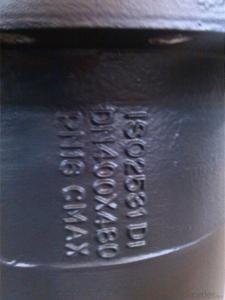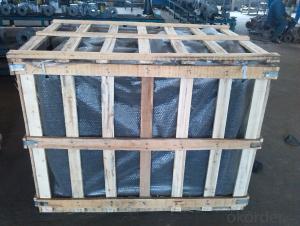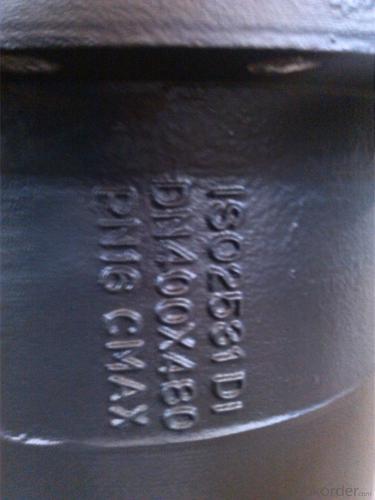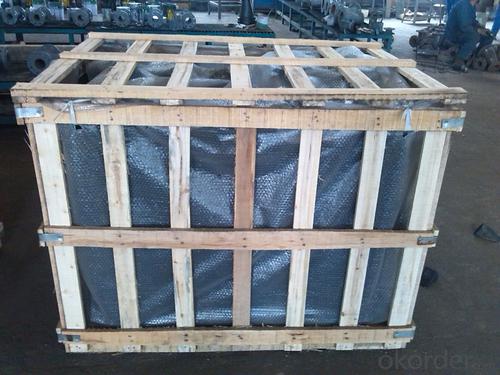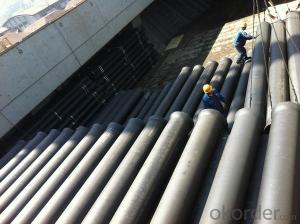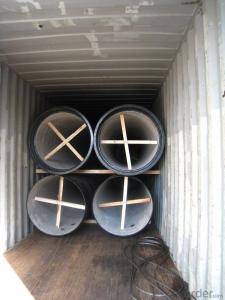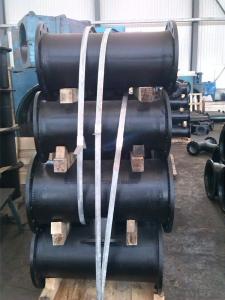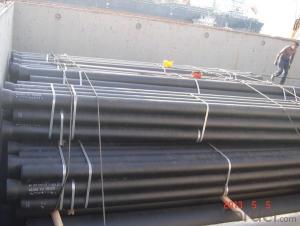DUCTILE IRON PIPE C
- Loading Port:
- Tianjin
- Payment Terms:
- TT OR LC
- Min Order Qty:
- -
- Supply Capability:
- 30000Tons m/month
OKorder Service Pledge
Quality Product, Order Online Tracking, Timely Delivery
OKorder Financial Service
Credit Rating, Credit Services, Credit Purchasing
You Might Also Like
•CNBM ductile iron pioes
•CNBM valves
•CNBM hydrants
•CNBM pumps
•CNBM manhole covers
•All kinds of relative accessories.
- Q: How do ductile iron pipes perform in acidic soil conditions?
- Ductile iron pipes perform well in acidic soil conditions due to their inherent corrosion resistance. The high carbon content and protective coating of ductile iron pipes make them less susceptible to corrosion from acidic substances in the soil, ensuring their durability and longevity.
- Q: How are ductile iron pipes protected against external corrosion?
- Ductile iron pipes are protected against external corrosion through a combination of manufacturing processes and external coatings. The first line of defense is the inherent corrosion resistance of ductile iron itself. The iron is treated with a special alloying element, typically magnesium, which forms a protective layer on the surface of the pipe. This layer acts as a barrier against corrosion and helps to extend the lifespan of the pipe. In addition to the corrosion-resistant properties of the iron, ductile iron pipes are also externally coated with protective materials. One common method is to apply a layer of asphaltic or bituminous coating to the pipe's surface. This coating acts as a barrier against moisture and corrosive substances in the soil, preventing them from coming into contact with the iron. It also provides a layer of insulation, reducing the likelihood of galvanic corrosion. Another method of external corrosion protection is the use of fusion-bonded epoxy (FBE) coatings. FBE is a thermosetting resin that is applied to the surface of the pipe and then heat-cured to form a strong and durable coating. This coating provides excellent resistance against corrosion, abrasion, and impact, making it a popular choice for ductile iron pipes in harsh environments. In some cases, additional protective measures such as cathodic protection systems may be employed. These systems use electric currents to counteract the corrosion process by supplying electrons to the pipe's surface. This helps to prevent corrosion from occurring, especially in areas where the coating may have been damaged or compromised. Regular maintenance and inspection are also crucial in ensuring the long-term protection of ductile iron pipes against external corrosion. This includes periodic cleaning, repair of any coating damages, and monitoring the integrity of the protective layers. Overall, the combination of the inherent corrosion resistance of ductile iron, external coatings, and maintenance practices ensures that ductile iron pipes are well-protected against external corrosion, allowing them to have a longer lifespan and deliver reliable performance in various applications.
- Q: Do ductile iron pipes require special handling during transportation?
- Yes, ductile iron pipes do require special handling during transportation. Ductile iron pipes are known for their strength and durability, but they can be susceptible to damage if not handled properly. These pipes are heavy and can be quite large in size, so it is important to use appropriate lifting and handling equipment during transportation. Special care should be taken to avoid dropping or impacting the pipes, as this can lead to cracks or fractures. Additionally, pipes should be stored and transported in a way that prevents them from rolling or shifting, which could cause damage to the pipe coating or fittings. It is also recommended to protect the pipes from exposure to extreme temperatures or weather conditions during transportation. By following these guidelines and taking the necessary precautions, the risk of damage to ductile iron pipes during transportation can be minimized.
- Q: Are ductile iron pipes suitable for hydroelectric power plants?
- Yes, ductile iron pipes are suitable for hydroelectric power plants. They possess excellent strength, durability, and corrosion resistance, making them ideal for transporting water in the power generation process. Additionally, their flexibility allows for easier installation and maintenance, reducing potential downtime in hydropower operations.
- Q: Is nodular cast iron pipe filled with Yau Ma Tei?
- Ductile iron pipes are defined as pipes made by casting more than 18 of casting molten iron by adding a spheroidal agent and then centrifugally centrifugally cast by a centrifugal nodular cast iron machineDuctile iron pipe ([span]Ductile Cast Iron Pipes), referred to as ball pipe, ductile iron pipe and ductile iron pipe etc..
- Q: If the ductile iron pipe is broken, can we use rush repair?
- In this way, manpower, material resources and financial resources can be saved, time can be saved, and unnecessary troubles to the citizens' water supply can also be reduced.
- Q: The difference between ductile iron pipe and steel pipe used in pipe jacking
- Comparison between ductile iron pipe and universal cast iron pipe: the process of making ductile iron pipe is cast by adding alkaline earth metal or rare metal such as magnesium and calcium in the raw material of common cast iron pipe.
- Q: What does ductile iron pipe "ND200" mean?
- The nominal pipe diameter and the inner diameter and the outer diameter were not equal, for example: the nominal diameter of 100MM seamless steel pipe 102*5, 108*5 several, 108 for the outer diameter of pipes, 5 said that the wall thickness of the tube, therefore, the pipe diameter (108-5-5 = 98MM), but it is not completely equal to pipe diameter minus two times the wall thickness difference, it can be said that the nominal diameter is close to the diameter, but not equal to the diameter of a pipe diameter specifications on the design drawings, so we use the nominal diameter, the purpose is to determine according to the nominal diameter pipe, flange and gasket structure and size connecting dimensions, nominal diameter is represented by the symbol DN, if the diameter of said in the design drawings, piping specifications should also make the table, show that the nominal diameter of a pipe wall thickness.
- Q: What is the expected joint performance of ductile iron pipes?
- The expected joint performance of ductile iron pipes is generally considered to be excellent. Ductile iron pipes are known for their high durability and strength, making them suitable for various applications such as water distribution, sewer systems, and industrial pipelines. One of the key aspects of joint performance in ductile iron pipes is their ability to withstand external loads and pressure. The joints in ductile iron pipes are typically designed to provide a tight and secure connection, ensuring minimal leakage and long-term structural integrity. This is achieved through various joint types, including push-on joints, mechanical joints, and restrained joints. Push-on joints are commonly used in ductile iron pipes and allow for easy installation without the need for special tools or equipment. These joints utilize a rubber gasket that provides a watertight seal, preventing any leakage. Mechanical joints, on the other hand, involve the use of mechanical devices such as bolts and nuts to create a rigid connection between the pipes. This type of joint provides additional strength and resistance against external forces. In terms of performance, ductile iron pipes have been extensively tested and proven to meet or exceed industry standards for pressure and bending strength. They have high resistance to corrosion, which ensures a long service life, and are also less susceptible to damage from ground movements or vibrations. These properties contribute to the overall joint performance of ductile iron pipes, ensuring reliable and efficient operation in various infrastructure systems. Overall, when installed and maintained properly, ductile iron pipes exhibit excellent joint performance, providing a reliable and durable solution for various applications in the water and wastewater industry.
- Q: Can ductile iron pipes be used for irrigation systems in agricultural fields?
- Ductile iron pipes are indeed suitable for use in agricultural fields for irrigation systems. Their durability, strength, and corrosion resistance are well-known, making them an excellent choice for a variety of applications, including irrigation systems. These pipes can withstand high pressures and effectively transport water for irrigation purposes. Moreover, the ductile iron material is resistant to various environmental factors like UV rays, soil chemicals, and temperature changes, ensuring that the pipes have a long lifespan. Additionally, ductile iron pipes exhibit excellent flow characteristics, enabling efficient water distribution across the agricultural fields. In summary, ductile iron pipes offer a reliable and sturdy option for irrigation systems in agricultural fields, delivering a sustainable and efficient solution for water distribution.
Send your message to us
DUCTILE IRON PIPE C
- Loading Port:
- Tianjin
- Payment Terms:
- TT OR LC
- Min Order Qty:
- -
- Supply Capability:
- 30000Tons m/month
OKorder Service Pledge
Quality Product, Order Online Tracking, Timely Delivery
OKorder Financial Service
Credit Rating, Credit Services, Credit Purchasing
Similar products
Hot products
Hot Searches
Related keywords
